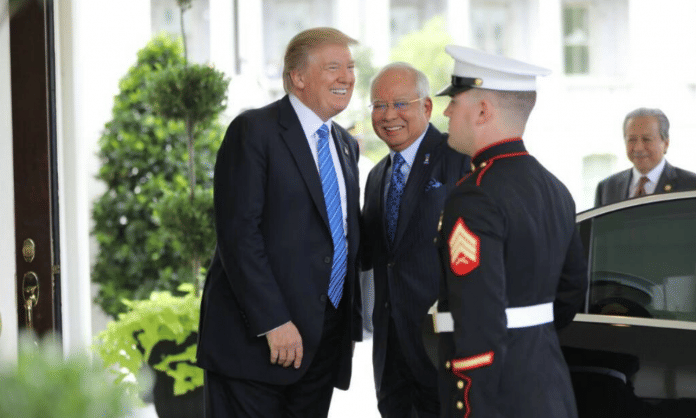Malaysia will hold its general elections on May 9, and Prime Minister Najib Razak’s campaign has one too many similarities with Donald Trump’s 2016 campaign. If Trump puts an end to the Iran deal, he risks not only his relationship with the Middle East, but America’s relationship with Europe as well. Meanwhile, encouraging a coup in Venezuela will give Russia and China a foothold in the United State’s backyard.
A rigged re-election
“Malaysian Prime Minister Najib Razak has some problems that might seem familiar to some in Washington. He gained office despite losing the popular vote. He has been unable to shake investigations on corruption charges despite firing a top law-enforcement official. His party has splintered over his leadership. Now, on May 9, he must face voters again,” writes the Washington Post editorial board.
And Razak’s solution, it seems, is to use the campaign slogan “Make my country great”.
“Redraw election districts so they are heavily tilted toward his party’s candidates. Adopt a budget-busting policy of handing out cash to likely supporters. Last but not least: Pass a new law banning “fake news,” and use it to silence critical media and to threaten the arrest of the opposition’s leader.”
“The betting in Kuala Lumpur is that all this will lead to Mr. Najib’s claiming a new mandate after Wednesday’s vote. President Trump, who favored the Malaysian leader with a White House visit last year, is unlikely to raise objections. That’s unfortunate, as Mr. Najib’s corrupt and increasingly authoritarian rule is leading his nation away from the United States.”
“A win by Mr. Najib will do more than reward his ugly tactics. It will likely increase Malaysia’s internal polarization: The prime minister has catered to Malay nationalism with xenophobic slogans and attacks on Christians and ethnic Chinese. It will propel Malaysia closer to China, which is happy to tolerate Mr. Najib’s authoritarianism and has taken advantage of Mr. Trump’s withdrawal from a trans-Pacific trade treaty that would have bound the United States closer to Malaysia. A president pursuing U.S. interests would be seeking to isolate Mr. Najib. Instead, if he pulls off his rigged reelection, Mr. Najib can probably count on Mr. Trump’s congratulations.”
Trump is risking piece
“Unless he experiences a sudden, unexpected change of heart, Donald Trump will reactivate US sanctions on Iran next week and, by doing so, attempt to wreck the west’s landmark 2015 nuclear agreement with Tehran. The likely negative consequences of Trump’s decision, if confirmed, are wide-ranging and extremely serious,”editorialises The Guardian.
“The destabilising of Iran, consequent on what would be seen there as an overt act of American aggression, could trigger a broader destabilisation of the Middle East. Predominantly Shia, Persian Iran is engaged in a fierce contest for power and influence with the Sunni Arab world, led by Saudi Arabia. If Trump, allied with Riyadh and Cairo, goes on the offensive, this rivalry may escalate as Iran inevitably reacts – with unforeseeable ramifications in places such as Yemen and Bahrain.”
“The harm a Trump decision to scupper the Iran deal would do to US relations with its European partners, all of whom are adamant in its defence, is incalculable. Emmanuel Macron, France’s president, made a personal appeal to Trump during his recent Washington visit and was crudely rebuffed. The same fate befell Germany’s Angela Merkel. There is scant reason to believe any last-minute British intervention will fare better. A permanent rift is opening.”
The Iran deal, as the Guardian writes, is a “diplomatic achievement”. It is far greater than just controlling nuclear proliferation. “It is about the credibility, unity – and common sense – of the western democracies in jointly managing the challenges thrown up by a dangerous world,” the Guardian writes.
A coup in Caracas?
“Giving the green light for a military coup is not only bad for America’s image; it is also a threat to U.S. strategic interests. That’s because encouraging a putsch in Venezuela could backfire and end up increasing Russian and Chinese influence in the Western Hemisphere,” writes Brian Fonseca in Foreign Policy.
Fonseca writes that the Russians, Chinese and the Cubans are now the primary source of financial, technical and material support to the Venezuelan military, replacing the United States. “The mere threat of a coup in Venezuela could be enough to rally the military around hard-liners and compel U.S. rivals to consider their preferred alternatives to the Maduro regime as collapse becomes imminent. Rivals with economic, political, and geostrategic interests in Venezuela, such as Russia and China, are far better positioned than the United States to influence the Venezuelan military during any transition.”
“In such a situation, Russia, China, and Cuba — in some formal or informal configuration — could abandon the flailing and ineffective leadership of President Nicolás Maduro and back a military regime in uncomfortably close geographic proximity to the United States.”
“The situation in Venezuela could also be an opportunity for Russia and China to expand their emerging strategic partnership with nations in the Western Hemisphere. Both countries are increasingly using their military ties to counter U.S. influence around the world. Russian and Chinese defense officials even discussed forging a strategic partnership in a series of recent meetings. For now, their relations have been limited to bilateral meetings of key leaders and joint military exercises. Still, that should be enough to give U.S. policymakers pause.”






